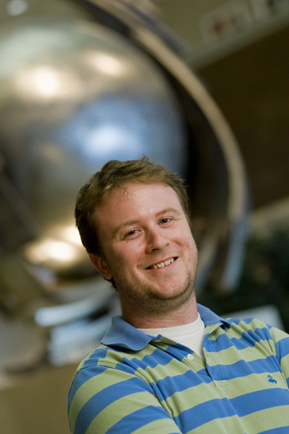Future Health-Care Managers Wonder What’s Next
The national debate leaves grad students facing uncertainty

Kevin Delaney has a special interest in the health-care debate swirling around Capitol Hill.
Enrolled in a dual master’s degree program in business administration and public health, Delaney (GSM’10, SPH’10) has little input in the outcome. But he knows his class will live with the results.
“I would be curious to see what we do when we finally get to have our seat behind the levers of power,” he says. “How is this debate really going to influence us? How are we going to make decisions in the future?”
Delaney is one of 170 students in the School of Management’s Health Sector Management Program. Students concentrate in one of two areas: those interested in the delivery of health care — usually in the public sector — and those focused on biotechnology, pharmaceuticals, and medical devices, all part of private industry.
Both groups likely will face a changed health-care landscape at the end of their two-year program.
Ahead of the current national debate, Massachusetts passed legislation in 2006 requiring health-care coverage for all residents. That makes the state a fascinating case study.
“In Massachusetts, they committed to cover everyone, but not to contain cost,” says Mark Allan (GSM’93), faculty director of the Health Sector Management Program and former executive director of the Boston Medical Center HealthNet Plan. “Massachusetts said, cover all and worry how to pay for it later. With the financial crisis, federal legislators can’t do that at the national level.”
Delaney and his fellow students have a particular interest as they follow the debate, watching citizens rail against a potential public option in the federal plan or hearing Congressman Joe Wilson (R-S.C.) call the president a liar and others refer to him as a socialist.
“Find the most conservative person in our class and that person will never say this is socialization,” says Delaney, who is the president of the Health Services Management Association, a student group. “They understand it’s not socialism, and there are not going to be death panels.”
As with the Massachusetts legislation, expanding access on the national level could be the easiest part of the equation. Cutting costs, SMG lecturer and executive-in-residence Allan says, “is where the politics really gets nasty. I think the essential element needs to be a change in the payment structures and what incentives they provide.”
The current system is based on a fee for service structure: physicians get paid per patient seen and procedure performed, the more the better, while hospitals also get a separate payment per procedure. Both receive additional payments if a patient is readmitted.
Allan believes that quality care, not quantity care, should be rewarded. Physicians and hospitals should get paid for successful treatment, a change he believes is feasible, but will take time to implement. “That is ultimately what you want,” he says. “You want to have the benefit accrue to the patients, depending on what they need.”
Andy Wurtzel (GSM’09) would welcome that change. He works at Newton-Wellesley Hospital as an administrative fellow in the operations management services department. His job is to squeeze more efficiency out of hospital systems.
“What will affect Newton-Wellesley and all other hospitals would be payment reform,” says Wurtzel. “So if they started looking at ways providers are reimbursed, then that could dramatically change hospital financing.”
The government, through federally run programs such as Medicare, could decide to cut back, he says. Private insurers generally follow suit. Suddenly everyone is paying less for certain procedures or not paying for unnecessary tests or medical mistakes.
Greg Silva (GSM’09), a senior consultant for ECG Management Consultants, says his clients at hospitals and medical groups are also eyeing how legislation could affect reimbursement. He points to the Mayo and Cleveland Clinics as good models — physicians are paid salaries and not on a fee-for-service basis. “All care is coordinated,” he says, “and that’s why they can provide excellent care at below-average cost.”
But he fears legislators have lost focus on health-care reform by politicizing the issue. “It’s easier for Republicans or conservatives to just throw rocks at the plan and gain political capital than to work through the issues,” Silva says.
Whether or not health-care reform passes, Delaney and the others in the program will be looking for jobs. He thinks new legislation has much less to do with their prospects than the sluggish economy, and he has a firsthand perspective: as Health Services Management Association president he tries to attract key players from the industry to club-sponsored events, allowing colleagues to rub shoulders with employers in hospital administration, public policy or health-care consulting, and information technology. Such networking has not been as productive as in years past.
The Boston native interned this summer at Kaiser Permanente, in California, where he hopes to land work after graduation. Once upon a time, an internship often resulted in a job offer. That certainty is gone.
“People are waiting longer to hire again,” Delaney says. “It’s a tough time for everybody.”
Comments & Discussion
Boston University moderates comments to facilitate an informed, substantive, civil conversation. Abusive, profane, self-promotional, misleading, incoherent or off-topic comments will be rejected. Moderators are staffed during regular business hours (EST) and can only accept comments written in English. Statistics or facts must include a citation or a link to the citation.